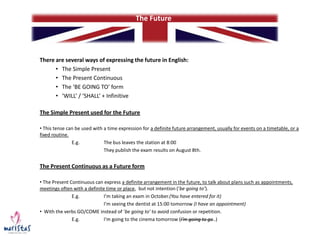
3ºeso future tenses
- 1. There are several ways of expressing the future in English: • The Simple Present • The Present Continuous • The ‘BE GOING TO’ form • ‘WILL’ / ‘SHALL’ + Infinitive The Simple Present used for the Future • This tense can be used with a time expression for a definite future arrangement, usually for events on a timetable, or a fixed routine. E.g. The bus leaves the station at 8:00 They publish the exam results on August 8th. The Present Continuous as a Future form • The Present Continuous can express a definite arrangement in the future, to talk about plans such as appointments, meetings often with a definite time or place, but not intention (‘be going to’). E.g. I’m taking an exam in October.(You have entered for it) I’m seeing the dentist at 15:00 tomorrow (I have an appointment) • With the verbs GO/COME instead of ‘be going to’ to avoid confusion or repetition. E.g. I’m going to the cinema tomorrow (I’m going to go..) The Future
- 2. The ‘BE GOING TO’ form Form: Present Continuous of ‘TO GO’ + ‘TO’ + Infinitive. E.g. I’m going to buy a bike. Is she going to come here?. Use: to talk about ideas for the future we have thought about before, such as: • Intention: E.g. I’m going to meet Tom at six. He’s going to be a doctor when he grows up. The verbs ‘COME’ and ‘GO’ are not common in this tense (to avoid repetition): I’m going to go… • Plans, ambitions: E.g. When I finish school, I’m going to work abroad for a year. • Prediction: It can express the speaker’s feeling of certainty, based on evidence. The time is usually not mentioned, but the action is expected to happen in the near or immediate future. E.g. Look at those clouds! It’s going to rain. She’s pale. I think she’s going to faint. The Future
- 3. ‘WILL’ / ‘SHALL’: The Future Simple Form: ‘WILL’ + Infinitive. ‘SHALL’ + Infinitive (only 1st person singular and plural: I / We). ‘WILL’ is the common future for: • Expressing the speaker’s opinions, assumptions and speculations about the future. E.g. I’m sure he’ll come back. I suppose they’ll sell the house. • Decisions made at the moment we speak, spontaneous decisions. E.g. I’ll have the cheesecake, please. Those bags look heavy. I’ll give you a hand. • Promises, offers, threats. E.g. I will bring you a present from London. ‘WON’T’ (all persons) is used for negative intention or future. Very few uses of ‘SHALL’ remain in Modern English. • Offer: Shall I help you?. • Suggest: Shall we go to the cinema tonight?. The Future
- 4. EXERCISE: Choose the correct verb for the following sentences. 1) Next summer, I …………………………… (travel) to New York. My sister lives there and she bought me a plane ticket for my birthday. 2) It's getting cold. I ……………………… (take) my coat! 3) Are you going to the cinema? Wait for me. I ……………………. (go) with you! 4) Jane and Tom ……………………………….. (not/study) medicine next year. Jane……………………… (study) French and Tom …………………………… (take) a gap year. 5. Mrs Simons, those bags seem quite heavy. I …………………………………(help) you carry them. 6. Experts say the Earth ………………………………(suffer) seriously if we continue polluting. 7. Look at those black clouds. I think it ………………………………………… (rain). 8. Bye Bye Joe. I ……………………………………….(phone) you as soon as I arrive home! 9. What ………………………………………(do) tomorrow? I …………………………………. (visit) my grandparents. 10. Anne: "I don't have enough money to pay for my lunch." Peter: " I …………………………………… (lend) you some." The Future